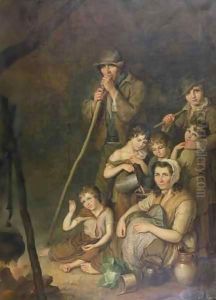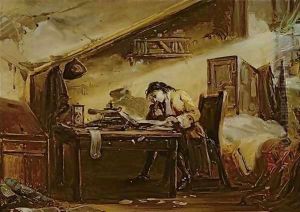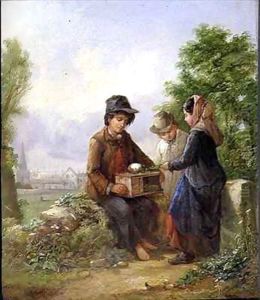John Joseph Barker Paintings
John Joseph Barker was an English painter known for his historical and genre paintings. Born on May 21, 1824, in Bath, Somerset, Barker was one of the twelve children of Benjamin Barker, a notable landscape painter, and his wife, who were both artists themselves. The artistic environment in which he was raised played a crucial role in shaping his career as an artist.
Barker showed an early interest in art and was trained by his father. He later moved to Paris to further his education in the arts, studying under renowned French painter Paul Delaroche. During his time in Paris, Barker was exposed to various artistic styles and movements, which influenced his own painting technique.
After his education, Barker returned to England, where he began to exhibit his works at the British Institution and the Royal Academy of Arts from the 1840s onwards. His paintings often depicted scenes from English history or literature, as well as contemporary life. He was known for his attention to detail, vivid characterizations, and the ability to convey dramatic narratives through his art.
Barker's works were well-received, and he gained a certain level of fame and recognition during his lifetime. Despite this, he did not achieve the same level of lasting renown as some of his contemporaries. Today, John Joseph Barker's paintings can be found in various art galleries and private collections.
He lived through the Victorian era, a period that was known for its significant cultural, political, and scientific changes. Barker’s art reflected some of the Victorian ideals, but he remained true to his own style without completely conforming to the popular artistic trends of his time.
John Joseph Barker passed away on November 2, 1904. While he may not be as widely known as some of his peers, his contributions to the art world, particularly in the realm of historical and genre painting, have been acknowledged by art historians and collectors, and his works continue to be appreciated for their historical value and artistic merit.


